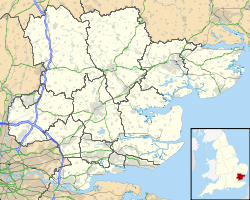RAF Ridgewell
| RAF Ridgewell USAAF Station 167 |
|
|---|---|
| Halstead, Essex, England | |

Aerial photograph of RAF Ridgewell, the bomb dump is to the right of the airfield as at 29 February 1944. Many B-17 Flying Fortresses of the 381st Bombardment Group are visible in the photo, parked on hardstands around the perimeter track.
|
|
| Coordinates | 52°02′N 0°32′E / 52.04°N 0.54°E |
| Type | Military airfield |
| Code | RD |
| Site information | |
| Owner | Air Ministry |
| Controlled by |
|
| Site history | |
| Built | 1942 |
| In use | 1942-1957 |
| Battles/wars |
European Theatre of World War II Air Offensive, Europe July 1942 - May 1945 |
| Garrison information | |
| Garrison |
RAF Bomber Command Eighth Air Force |
| Occupants |
No. 90 Squadron RAF 381st Bombardment Group (Heavy) |
Royal Air Force Ridgewell or more simply RAF Ridgewell is a former Royal Air Force station located 7.5 miles (12.1 km) north west of Halstead, Essex, England.
During the Second World War, the airfield was used by the Royal Air Force and the United States Army Air Forces Eighth Air Force.
RAF Ridgewell was an early example of stations completed to Class A heavy bomber airfield design for the RAF, and had three intersecting runways of 6,500 ft each in length, thirty-six hardstands, two T-2 hangars and accommodation for 2,900 men in temporary buildings.
The airfield was opened in December 1942 and was first used by No. 90 Squadron of RAF Bomber Command, equipped with Short Stirling Bombers until May 1943, the station being at that time a satellite of RAF Stradishall.
RAF Ridgewell was the only long-term heavy bomber airfield of the Eighth Air Force in Essex. For United States Army Air Forces (USAAF) use, the number of hardstandings was increased to the fifty required by a US bomb group. The station was part of the 1st Combat Wing establishment of the 1st Division and was the furthest east of its thirteen heavy bomber stations. It was assigned USAAF designation Station 167, station code "RD".
From 30 June 1943 the airfield was used by the USAAF 381st Bombardment Group (Heavy), arriving from Pueblo AAB, Colorado. Its tail code was Triangle-L. The 381st Bomb Group consisted of the following operational squadrons and fuselage codes:
After V-E Day, the 381st Bomb Group returned to Sioux Falls AAF, South Dakota in July 1945 and was inactivated on 28 August.
...
Wikipedia


